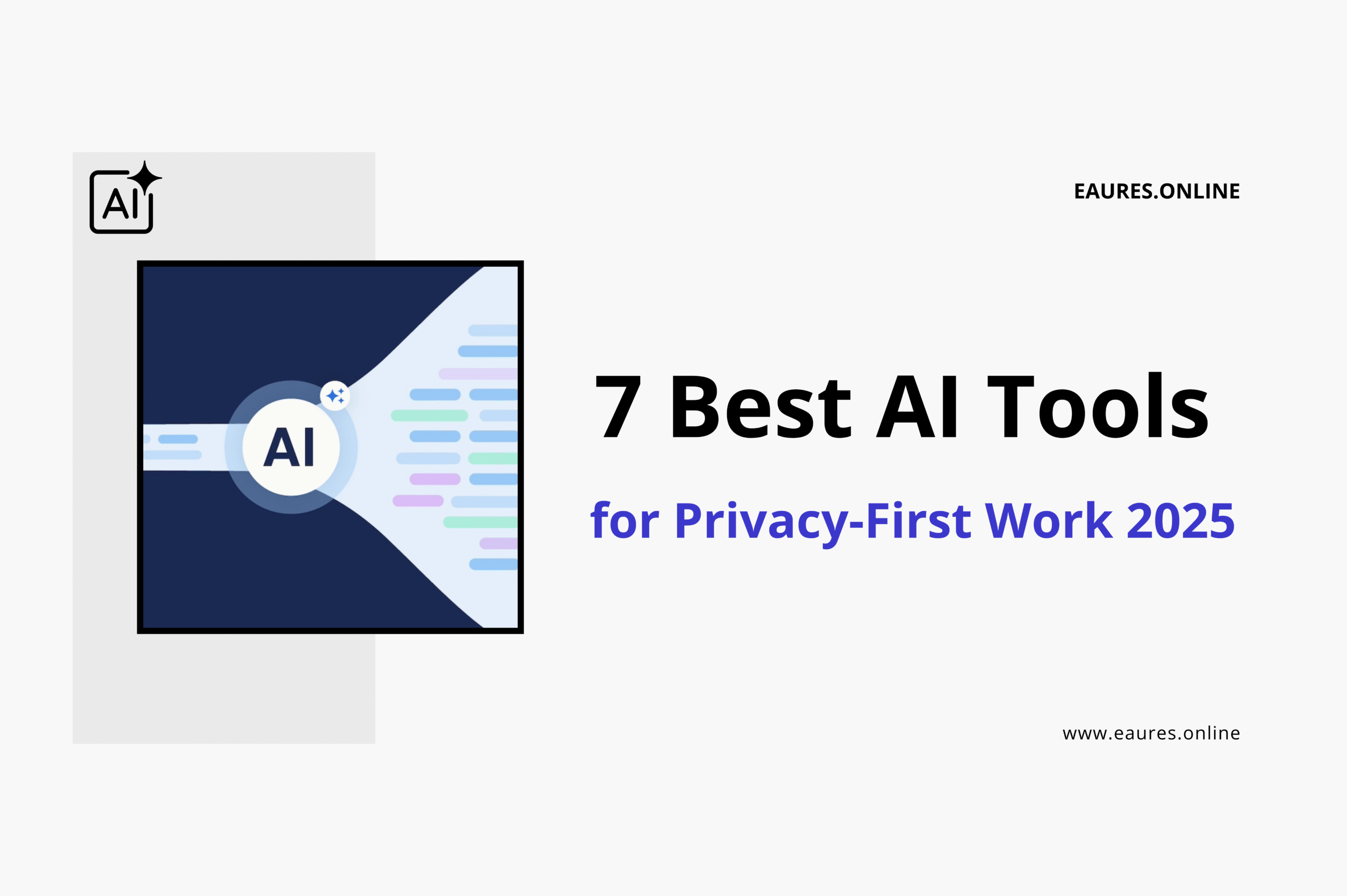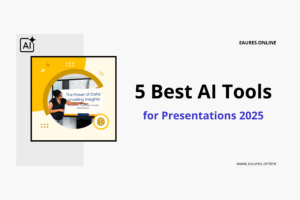Table of Contents
7 Best AI Tools for Privacy-First Work 2025
In the ever-evolving digital landscape of 2025, the importance of privacy and data protection has reached new heights. With the global surge in data breaches, cyber threats, and privacy concerns, businesses and individuals alike are prioritizing privacy-first tools to safeguard their sensitive information. AI tools that prioritize privacy and data security are becoming essential in navigating this complex environment. This article explores the best AI tools for privacy-first work in 2025, highlighting cutting-edge solutions that ensure your data remains secure while boosting productivity.
Understanding Privacy-First AI Tools
As artificial intelligence becomes a central part of daily operations in various industries, the need for privacy-first AI tools has intensified. These tools are designed to comply with the most stringent data protection regulations such as the General Data Protection Regulation (GDPR) and the California Consumer Privacy Act (CCPA). A privacy-first AI tool is not only effective in automating tasks but also ensures that user data is processed, stored, and used in a way that maintains the highest levels of security and confidentiality.
Why Privacy Matters in AI?
The core of privacy-first AI tools lies in their commitment to keeping personal and organizational data safe. With AI being utilized in everything from customer service to healthcare, it’s crucial that these systems minimize the collection of personal data and comply with evolving privacy standards. Here are some key reasons why privacy-first AI tools are vital for 2025:
- Compliance with Regulations: AI tools must adhere to laws like GDPR, CCPA, and others that govern data protection. Non-compliance could result in heavy fines and loss of consumer trust.
- User Trust: Consumers today are more conscious of how their data is used. Tools that emphasize privacy build trust, leading to more loyal customers.
- Cybersecurity: With the rise of cyberattacks, safeguarding data through AI tools that prioritize security is paramount.
- Data Minimization: Privacy-first tools ensure that only necessary data is collected, minimizing the risk of data misuse or unauthorized access.

The Rise of AI and Privacy-First Solutions
The emergence of privacy-first AI tools is not just a trend but a fundamental shift in how businesses approach AI and data privacy. These tools are built with privacy as a cornerstone, allowing businesses to leverage AI’s potential without compromising on security or user trust. Let’s dive into the top 7 AI tools that are leading the charge in ensuring privacy-first work.
1. Read AI: The Privacy-First Meeting Notetaker and Assistant
Read AI is a revolutionary AI tool designed specifically for professionals who need to transcribe meetings, manage schedules, and extract key insights from conversations. What sets Read AI apart is its focus on privacy. Unlike other AI transcription tools, Read AI processes all data locally, ensuring that sensitive information is never uploaded to the cloud. This tool’s end-to-end encryption ensures that meeting notes, sensitive data, and personal insights remain secure.
Key Features:
- Local Data Processing: All data is processed on your device, ensuring that sensitive information never leaves your secure environment.
- End-to-End Encryption: Your meeting data is encrypted both in transit and at rest, protecting it from unauthorized access.
- GDPR-Compliant: Read AI is designed with the strictest data protection regulations in mind.
For a more detailed look at this tool, visit Read AI: The Privacy-First Meeting Notetaker.
2. Proecto.AI: Leading Privacy Protection for Enterprises
Proecto.AI is a powerful AI platform designed to help businesses with privacy-first approaches to data analysis. The platform focuses on anonymizing sensitive data before it is processed, ensuring compliance with global privacy standards. Its ability to provide robust privacy features without sacrificing AI performance makes it an ideal choice for enterprises that prioritize both innovation and security.
Key Features:
- Data Anonymization: Proecto.AI anonymizes sensitive data to ensure that it cannot be traced back to individuals.
- Cross-Platform Compatibility: The platform integrates seamlessly with existing business systems.
- Secure Cloud Storage: Proecto.AI ensures that data storage complies with privacy regulations, offering encrypted and secure cloud solutions.
Learn more about Proecto.AI’s commitment to privacy on their official blog.
3. FootfallCam: Privacy-First AI for Retail and Analytics
FootfallCam provides privacy-first AI solutions for the retail and customer analytics sectors. The tool focuses on gathering valuable insights about customer behavior while ensuring that personal data is never captured. By using advanced AI and computer vision techniques, FootfallCam collects anonymized data that helps businesses optimize their store layouts and customer engagement strategies.
Key Features:
- Anonymous Data Collection: FootfallCam ensures no personal data is collected while analyzing foot traffic and customer behavior.
- Real-Time Analytics: Offers real-time insights into customer behavior and store performance.
- Compliance with GDPR: Fully compliant with GDPR, ensuring that privacy is maintained throughout the data collection process.
Explore FootfallCam’s privacy-first analytics solution on their website here.

4. Proton AI: A Secure Assistant for Privacy-Conscious Users
Proton AI is an AI-powered personal assistant designed for individuals and organizations who prioritize privacy. Proton AI focuses on securely handling sensitive tasks like email encryption, calendar management, and voice transcription. The tool is built to operate in full compliance with global privacy laws and ensures that all user data is kept secure.
Key Features:
- End-to-End Encryption: All data processed by Proton AI is encrypted end-to-end.
- No Data Tracking: Proton AI does not track user activity, ensuring maximum privacy.
- Open-Source and Transparent: The open-source nature of Proton AI allows users to inspect and verify the security measures in place.
Learn more about Proton AI’s privacy features at Proton AI Privacy.
5. Tonic.AI: Privacy for Machine Learning Data
Tonic.AI provides privacy-preserving machine learning tools, allowing businesses to generate and use synthetic data without compromising on privacy. By creating data that mimics real-world data without revealing any personal information, Tonic.AI ensures that businesses can still use machine learning for predictive analysis while protecting customer privacy.
Key Features:
- Synthetic Data Generation: Creates synthetic data that mimics real-world datasets without including any personal information.
- Data Anonymization: Tonic.AI’s algorithms anonymize sensitive data before it’s used for analysis.
- Machine Learning Model Optimization: Enhances the accuracy of machine learning models while maintaining privacy standards.
Explore how Tonic.AI is transforming data privacy for machine learning on their website.
6. Unspy.AI: AI-Powered Privacy for Digital Marketing
Unspy.AI is an AI tool focused on enhancing privacy in digital marketing. It enables businesses to create personalized marketing campaigns without collecting sensitive customer data. Unspy.AI employs advanced AI algorithms to analyze customer behavior without tracking personal data, ensuring that marketers can maintain customer trust while improving targeting and ad performance.
Key Features:
- Anonymized Customer Insights: Uses AI to analyze customer behavior without collecting personal data.
- GDPR Compliant: Fully compliant with GDPR and other privacy regulations.
- Effective Campaign Targeting: Allows businesses to target ads effectively without violating privacy rights.
Learn how Unspy.AI can improve your marketing while keeping your customers’ data safe here.
7. DataGuard.AI: Privacy-Focused AI for Data Governance
DataGuard.AI offers advanced AI solutions to automate data governance processes with a focus on privacy. The tool ensures that organizations can efficiently manage and protect sensitive data, particularly in sectors that deal with high volumes of personal information, such as healthcare and finance.
Key Features:
- Automated Data Governance: Automates data management processes to ensure compliance with privacy laws.
- Sensitive Data Protection: Provides encryption and access control features to protect sensitive information.
- Audit and Compliance Reporting: Helps organizations generate audit reports to ensure that all privacy regulations are met.
For more information about DataGuard.AI and how it helps businesses stay compliant, visit their official site.
The Future of Privacy-First AI Tools
As we move further into 2025, privacy-first AI tools will continue to play an essential role in data protection. With stringent regulations and an increasingly informed public, businesses that prioritize privacy will stand out and build trust with customers. The tools discussed in this article are leading the way in providing secure, privacy-compliant AI solutions for various industries. By adopting these solutions, organizations can ensure that their operations remain secure while benefiting from the advanced capabilities of AI.

Expanding the Scope of Privacy-First AI Tools
As we transition further into an era where artificial intelligence is embedded in every facet of business and personal life, the demand for privacy-first tools will continue to grow. While the tools listed above are currently some of the best available in 2025, it’s important to recognize that privacy in AI is not a static field—it’s evolving rapidly to address emerging threats and challenges. Companies and individuals must continuously stay informed about the latest developments in AI privacy and data protection.
The Need for Adaptation to Emerging Threats
Privacy-first AI tools, though sophisticated, face constant challenges in adapting to new forms of cyberattacks, evolving regulations, and shifts in public perception. As AI systems become more advanced, they also become more complex and, in some cases, vulnerable to breaches. It is essential for AI developers to remain agile and adaptable in their approach to privacy. Regular updates and improvements in security features are necessary to ensure that these tools remain resilient against novel security threats, such as deepfake technologies, AI-powered phishing attacks, and privacy violations through machine learning models.
Moreover, privacy-first AI tools must incorporate strategies to detect and mitigate malicious activities, ensuring that user data is not exposed or misused during AI-driven processes. These tools must work in tandem with cybersecurity systems to offer a robust defense mechanism against both external and internal threats.
Regulatory Landscape and Its Impact on AI Privacy
Privacy laws and regulations are becoming stricter worldwide, and they are expected to continue evolving in 2025 and beyond. While GDPR remains one of the most comprehensive data protection regulations, countries like the United States, China, and India are developing their own data privacy laws. These regulations may have different requirements for data storage, encryption, access, and sharing practices, which will require businesses to adopt a global approach to privacy compliance.
AI tools that are designed with privacy in mind must be capable of not only adhering to local laws but also supporting multinational organizations in complying with various regional data protection regulations. This will ensure that businesses remain compliant in every jurisdiction in which they operate.
Furthermore, with new laws on the horizon, such as the proposed AI Act in the European Union, AI tools must be designed with foresight to meet compliance requirements that may emerge in the near future. Privacy-first tools will be instrumental in helping businesses navigate this complex regulatory environment.
Consumer Expectations and the Privacy-First Approach
Consumers have become increasingly aware of their digital privacy rights, and they are more selective about the services and products they use. In 2025, it is expected that the demand for privacy-first AI tools will be driven largely by consumer expectations. Customers will choose to engage with companies that demonstrate a clear commitment to privacy and ethical data handling practices.
In fact, consumers are likely to favor businesses that prioritize transparency in how their data is used. Companies that clearly outline their data handling policies and offer easy-to-understand explanations of how AI systems function will have a competitive edge. Privacy-first AI tools that empower users with greater control over their data, such as providing easy-to-use privacy settings and personalized data management options, will be more appealing to privacy-conscious consumers.
The rise of “privacy-aware” consumers means that businesses will need to provide solutions that enhance user autonomy and foster trust. For AI tools, this could mean developing systems that enable users to better understand how their data is being processed, with an emphasis on opt-in and opt-out choices for specific types of data use.
Future-Proofing with Privacy-First AI Tools
One of the most critical aspects of adopting privacy-first AI tools is ensuring that they are future-proof. The world of data privacy is fast-paced, and new vulnerabilities emerge frequently. As AI systems become more integrated into daily life, it’s essential for businesses and developers to plan for long-term privacy by incorporating flexibility and scalability into their AI solutions.
Privacy-first AI tools must be designed to scale without sacrificing data security. Whether it’s for small businesses looking to grow or large enterprises handling vast amounts of sensitive data, scalability is crucial. Additionally, future-proof tools must be equipped with flexible frameworks that can quickly adapt to new technologies, regulations, and privacy threats.
To future-proof their AI systems, organizations must invest in AI tools that regularly update their algorithms, security protocols, and compliance measures. This will allow them to stay ahead of emerging threats and continue to protect their users’ data while keeping pace with the rapid evolution of AI technologies.
The Role of AI Developers and Privacy Advocacy
AI developers play a crucial role in the advancement of privacy-first AI tools. By integrating privacy by design into AI development, developers ensure that privacy is built into the core of AI systems rather than being added as an afterthought. This requires a shift in mindset, with developers adopting a privacy-first philosophy at every stage of AI development, from the initial design phase to deployment and ongoing updates.
Privacy advocates will also play a role in shaping the future of AI privacy tools. As the debate around data privacy continues to intensify, these advocates will push for stronger regulations, greater transparency, and more ethical practices in AI development. Their advocacy will help ensure that privacy-first AI tools not only meet legal requirements but also reflect ethical considerations regarding data collection, usage, and retention.
AI Privacy Education and Awareness
As AI technologies continue to impact various industries, it is crucial to foster awareness and education about the importance of privacy in AI. Businesses and individuals must stay informed about privacy-first principles, including how to choose, use, and manage AI tools responsibly. With privacy concerns growing, education about privacy rights, data protection strategies, and the capabilities of privacy-first AI tools will be key in empowering users to make informed decisions about the AI tools they use.
Education about AI privacy should not be limited to developers and organizations; it should also extend to consumers. As consumers become more knowledgeable about privacy-first solutions, they will increasingly demand better privacy standards from the companies they interact with.

Conclusion: A Secure Future with Privacy-First AI Tools
The landscape of AI and data privacy is rapidly evolving in 2025. Privacy-first AI tools are becoming an essential aspect of maintaining data security, trust, and compliance in a world where data breaches and privacy violations are increasingly common. The seven tools discussed in this article exemplify the best practices in privacy-focused AI, ensuring that organizations can leverage artificial intelligence without compromising on security or ethical considerations.
As businesses adopt these privacy-first AI tools, they will not only enhance their operational efficiency but also build stronger relationships with customers based on trust and transparency. The future of AI is undeniably linked with privacy, and those who prioritize it will be well-positioned to thrive in a world that values data security above all else.
By staying ahead of regulatory changes, adopting adaptable and scalable tools, and fostering an ongoing commitment to privacy, businesses can ensure that their AI-driven processes are future-proof and aligned with the highest standards of data protection. In doing so, they will help create a more secure and privacy-respecting digital ecosystem for years to come.





Hi, how have you been lately?
aue3k9